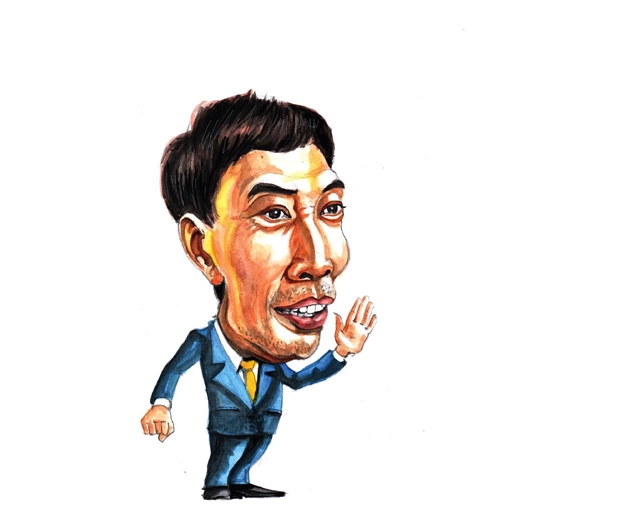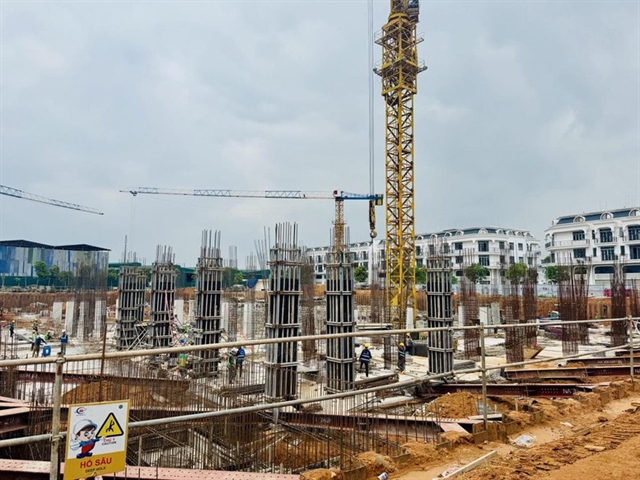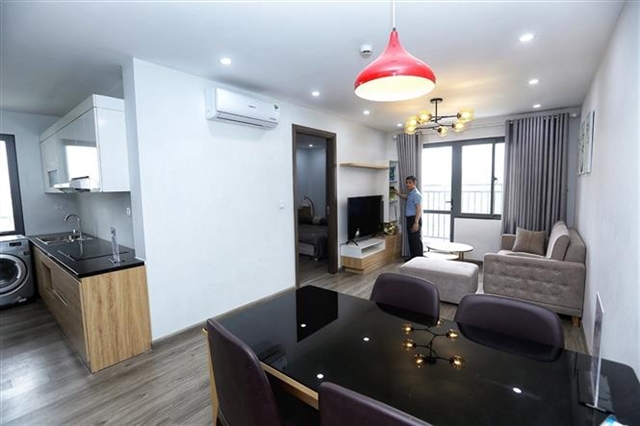Social housing is crucial to the country’s social and economic infrastructure, making collaboration between the State, market mechanisms, and relevant stakeholders essential.

*Võ Trí Thành
On May 29, 2025, the National Assembly passed a landmark resolution introducing pilot mechanisms and policies aimed at accelerating the development of social housing across the country. This move marks a significant shift in the Government's approach to addressing the long-standing housing challenges faced by low-income citizens and workers.
Housing is a fundamental need for every citizen, and it plays a crucial role in ensuring the quality of life, particularly for low-income groups who often struggle to access adequate accommodation.
The Constitution of the Socialist Republic of Việt Nam, adopted on November 28, 2013, firmly enshrines the right to housing, ensuring citizens the right to legal accommodation and inviolability of their homes. This legal foundation has underpinned the Government's policies to ensure no one is left behind in the urbanisation process, ensuring social welfare for all.
In recent years, the Government has made considerable efforts to address housing shortages, especially for low-income workers. However, two main challenges remain.
First, there is a significant gap between supply and demand, with the availability of affordable social housing becoming increasingly limited as demand continues to rise.
Second, housing prices have escalated, and the price range of VNĐ40-50 million (US$1,550-1,940) per square metre has become inaccessible in major cities. Considering average annual incomes of around $3,800 in Hà Nội and $7,600 in HCM City, it would take residents over 50 years of earnings to afford a private house, placing both cities among Southeast Asia's top cities for the widest gap between housing prices and income levels.
The Government has made a determined push to resolve these issues by implementing policies that encourage the development of social housing, with a particular focus on restructuring financial policies and facilitating access to affordable housing loans.
Two years ago, a loan package initially valued at VNĐ120 trillion – later increased to VNĐ145 trillion ($5.6 billion) – was launched, funded by commercial banks, with the aim of helping citizens access social housing through preferential low-interest rates.
However, despite the package's potential, its disbursement has been slow, with only around VNĐ4 trillion disbursed to date, which is less than 3 per cent of the total amount.
One of the key reasons for the slow disbursement is the limited supply of social housing. Many localities have not fully disclosed eligible projects, and both citizens and businesses face significant challenges in navigating the bureaucracy and accessing necessary information.
Additionally, the loan conditions are often seen as stringent, particularly for individuals who lack the financial capacity to prove their ability to repay, despite a genuine need for housing. Furthermore, even though the loan interest rates have been adjusted, the rates are still not low enough to encourage low-income individuals or property developers to take advantage of the scheme.

A social housing project in Uy Nỗ Commune, Đông Anh District, Hà Nội, is under construction. Hà Nội is set to complete 4,730 social housing units in 2025. — Photo baoxaydung.vn
The Ministry of Construction has suggested several measures to speed up disbursement, including greater transparency in listing eligible projects and more flexible credit policies. One proposal is to allow social housing loans to be excluded from the credit growth limits of banks.
The success of this loan package is crucial not only to meeting the target of one million social housing units by 2030 but also to affirm the Government's commitment to ensuring the right to legal housing and improving the living standards of its citizens, particularly those with low incomes, amid rapid urbanisation.
In addition, the amended Housing Law, effective from January 2025, also marked a major step in Việt Nam’s social welfare policy. It broadens eligibility for social housing to include veterans, low-income households, workers, students and other vulnerable groups, with clear, transparent criteria for access.
The amended Housing Law offers various development models, including public investment, foreign and domestic enterprise involvement and initiatives undertaken by the Vietnam General Confederation of Labour to provide rental housing for workers. These changes encourage broader participation from different stakeholders, aiming to meet the increasing demand for affordable housing.
While the Housing Law lays down the legal framework to develop social housing, the Government has identified several key challenges in its implementation.
The existing credit packages and loan schemes, while beneficial, have proven insufficient in addressing the urgent housing needs. This issue is compounded by the fact that the VNĐ145 trillion loan package relies on commercial banks, rather than the State budget, leading to delays in disbursement due to the complex requirements of the banking sector.
To address ongoing challenges, the Government has issued a special resolution, effective from June 1, 2025, to remove legal, procedural and financial barriers holding back social housing development.
Centred on three pillars – proper planning, real incentives and accurate targeting – the resolution demands that social housing be integrated within urban areas, with full access to infrastructure like transport, healthcare and education, as emphasised by Prime Minister Phạm Minh Chính, ensuring it is built on well-located land, not in remote areas.

A show home at the Đại Thịnh social housing area, Mê Linh District, Hà Nội. — VNA/VNS Photo Tuấn Anh
One key change allows certain social housing projects to skip the bidding process, helping developers save time and costs. Planning and approval procedures will also be streamlined for faster construction.
The resolution also proposes creating a National Housing Fund to provide long-term, stable financing for social housing, reducing reliance on slow and uncertain commercial loans.
The resolution also tackles issues of compensation, land clearance and infrastructure for social housing projects. It gives local authorities more flexibility to decide who qualifies for support, allowing them to better respond to the specific needs of their communities.
It removes barriers for investors by cutting red tape, allowing land allocation without bidding for certain projects, and offering stronger tax, credit and infrastructure incentives. A fairer profit margin mechanism is also under review to attract more private developers.
Importantly, the resolution simplifies procedures for homebuyers and renters, while giving local authorities more flexibility in identifying those in need, including workers living far from jobs.
The Government’s focus on affordable housing is a crucial element in achieving social stability and promoting sustainable urban development. However, its success will depend on effective implementation at the local level, where leadership and commitment are essential to overcoming the challenges of rapid urbanisation.
Besides, the Government also should consider creating a funding package similar to the previous VNĐ30 trillion scheme to support social housing development while waiting for the National Housing Fund.
In 2015, the Government launched a VNĐ30 trillion package, funded by the State budget, to help low-income people and businesses access housing with favourable interest rates. However, the current VNĐ145 trillion package, backed by commercial banks, faces slow disbursement due to complex procedures. The Government must encourage banks to balance between profitability and social responsibility.
Social housing is crucial, as it plays a significant role in the country’s social and economic infrastructure. Therefore, the collaboration between the State, market mechanisms and relevant stakeholders is essential. Moreover, we must start planning for the future, ensuring that, as society advances, we also develop affordable housing sectors, just as developed countries are doing.
*Võ Trí Thành is former vice-president at the Central Institute for Economic Management (CIEM) and a member of the National Financial and Monetary Policy Advisory Council. With a doctorate in economics from the Australian National University, he focuses on macroeconomic policy, trade liberalisation, and institutional reform. He authors the Việt Nam News column Analyst’s Pick.
BOX
Affordable housing policies around the world
Affordable housing is a critical issue, particularly for low-income citizens. Many developed countries around the world have implemented policies to reduce the financial burden on residents, ensuring stable housing for all.
United States: The US offers several policies to assist low-income individuals with housing. The Housing Choice Voucher (Section 8) programme helps citizens rent homes with government subsidies, reducing rental costs. Additionally, the FHA Loans support first-time homebuyers with low down payments and reasonable interest rates. The Low-Income Housing Tax Credit (LIHTC) encourages developers to build affordable housing for low-income households.
Germany: Germany places great emphasis on public housing, with government-managed companies offering affordable rental apartments. Low-income families can access subsidised loans to buy their first homes. Tax policies and financial support help real estate developers build more social housing.
Sweden: Sweden has a well-established public housing system, particularly in major cities like Stockholm and Gothenburg, where affordable rental apartments are available. The government also supports young families with loans to purchase their first homes, creating a more equitable housing system.
Singapore: Singapore’s public housing system, through the Housing and Development Board (HDB), offers affordable homes to citizens. The government provides financial assistance via the Central Provident Fund (CPF) and low-interest loans, ensuring that citizens can own or rent homes easily.
South Korea: South Korea’s social housing programmes offer low-interest loans and long repayment periods. The government also promotes low-rent housing and provides incentives to developers to build affordable housing. — VNS
Read original article here